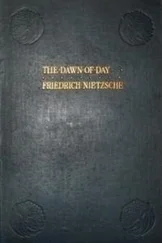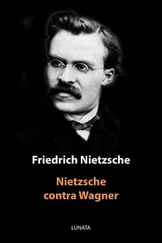Friedrich Nietzsche.
Turin, Christmas 1888 .
I believe that artists very often do not know what they are best able to do. They are much too vain. Their minds are directed to something prouder than merely to appear like little plants, which, with freshness, rareness, and beauty, know how to sprout from their soil with real perfection. The ultimate goodness of their own garden and vineyard is superciliously under–estimated by them, and their love and their insight are not of the same quality. Here is a musician who is a greater master than anyone else in the discovering of tones, peculiar to suffering, oppressed, and tormented souls, who can endow even dumb misery with speech. Nobody can approach him in the colours of late autumn, in the indescribably touching joy of a last, a very last, and all too short gladness; he knows of a chord which expresses those secret and weird midnight hours of the soul, when cause and effect seem to have fallen asunder, and at every moment something may spring out of nonentity. He is happiest of all when creating from out the nethermost depths of human happiness, and, so to speak, from out man's empty bumper, in which the bitterest and most repulsive drops have mingled with the sweetest for good or evil at last. He knows that weary shuffling along of the soul which is no longer able either to spring or to fly, nay, which is no longer able to walk, he has the modest glance of concealed suffering, of understanding without comfort, of leave–taking without word or sign; verily as the Orpheus of all secret misery he is greater than anyone, and many a thing was introduced into art for the first time by him, which hitherto had not been given expression, had not even been thought worthy of art—the cynical revolts, for instance, of which only the greatest sufferer is capable, also many a small and quite microscopical feature of the soul, as it were the scales of its amphibious nature—yes indeed, he is the master of everything very small. But this he refuses to be! His tastes are much more in love with vast walls and with daring frescoes!…He does not see that his spirit has another desire and bent—a totally different outlook—that it prefers to squat peacefully in the corners of broken–down houses: concealed in this way, and hidden even from himself, he paints his really great masterpieces, all of which are very short, often only one bar in length—there, only, does he become quite good, great and perfect, perhaps there alone.—Wagner is one who has suffered much—and this elevates him above other musicians.—I admire Wagner wherever he sets himself to music
Wherein I Raise Objections.
With all this I do not wish to imply that I regard this music as healthy, and least of all in those places where it speaks of Wagner himself. My objections to Wagner's music are physiological objections. Why should I therefore begin by clothing them in æsthetic formulæ? Æsthetic is indeed nothing more than applied physiology—The fact I bring forward, my " petit fait vrai ," is that I can no longer breathe with ease when this music begins to have its effect upon me; that my foot immediately begins to feel indignant at it and rebels: for what it needs is time, dance, march; even the young German Kaiser could not march to Wagner's Imperial March,—what my foot demands in the first place from music is that ecstasy which lies in good walking, stepping and dancing. But do not my stomach, my heart, my circulation also protest? Are not my intestines also troubled? And do I not become hoarse unawares? … in order to listen to Wagner I require Géraudel's Pastilles…. And then I ask myself, what is it that my whole body must have from music in general? for there is no such thing as a soul…. I believe it must have relief: as if all animal functions were accelerated by means of light, bold, unfettered, self–reliant rhythms, as if brazen and leaden life could lose its weight by means of delicate and smooth melodies. My melancholy would fain rest its head in the haunts and abysses of perfection; for this reason I need music. But Wagner makes one ill—What do I care about the theatre? What do I care about the spasms of its moral ecstasies in which the mob—and who is not the mob to–day?—rejoices? What do I care about the whole pantomimic hocus–pocus of the actor? You are beginning to see that I am essentially anti–theatrical at heart. For the stage, this mob art par excellence , my soul has that deepest scorn felt by every artist to–day. With a stage success a man sinks to such an extent in my esteem as to drop out of sight; failure in this quarter makes me prick my ears, makes me begin to pay attention. But this was not so with Wagner, next to the Wagner who created the most unique music that has ever existed there was the Wagner who was essentially a man of the stage, an actor, the most enthusiastic mimomaniac that has perhaps existed on earth, even as a musician. And let it be said en passant that if Wagner's theory was "drama is the object, music is only a means"—his practice was from beginning to end "the attitude is the end, drama and even music can never be anything else than means." Music as the manner of accentuating, of strengthening, and deepening dramatic poses and all things which please the senses of the actor; and Wagnerian drama only an opportunity for a host of interesting attitudes!—Alongside of all other instincts he had the dictatorial instinct of a great actor in everything and, as I have already said, as a musician also.—On one occasion, and not without trouble, I made this clear to a Wagnerite pur sang ,—clearness and a Wagnerite! I won't say another word. There were reasons for adding; "For heaven's sake, be a little more true unto yourself! We are not in Bayreuth now. In Bayreuth people are only upright in the mass; the individual lies, he even lies to himself. One leaves oneself at home when one goes to Bayreuth, one gives up all right to one's own tongue and choice, to one's own taste and even to one's own courage, one knows these things no longer as one is wont to have them and practise them before God and the world and between one's own four walls. In the theatre no one brings the finest senses of his art with him, and least of all the artist who works for the theatre,—for here loneliness is lacking; everything perfect does not suffer a witness…. In the theatre one becomes mob, herd, woman, Pharisee, electing cattle, patron, idiot—Wagnerite: there, the most personal conscience is bound to submit to the levelling charm of the great multitude, there the neighbour rules, there one becomes a neighbour."
1.
The aim after which more modern music is striving, which is now given the strong but obscure name of "unending melody," can be clearly understood by comparing it to one's feelings on entering the sea. Gradually one loses one's footing and one ultimately abandons oneself to the mercy or fury of the elements: one has to swim. In the solemn, or fiery, swinging movement, first slow and then quick, of old music—one had to do something quite different; one had to dance. The measure which was required for this and the control of certain balanced degrees of time and energy, forced the soul of the listener to continual sobriety of thought.—Upon the counterplay of the cooler currents of air which came from this sobriety, and from the warmer breath of enthusiasm, the charm of all good music rested—Richard Wagner wanted another kind of movement,—he overthrew the physiological first principle of all music before his time. It was no longer a matter of walking or dancing,—we must swim, we must hover…. This perhaps decides the whole matter. "Unending melody" really wants to break all the symmetry of time and strength; it actually scorns these things—Its wealth of invention resides precisely in what to an older ear sounds like rhythmic paradox and abuse. From the imitation or the prevalence of such a taste there would arise a danger for music—so great that we can imagine none greater—the complete degeneration of the feeling for rhythm, chaos in the place of rhythm…. The danger reaches its climax when such music cleaves ever more closely to naturalistic play–acting and pantomime, which governed by no laws of form, aim at effect and nothing more…. Expressiveness at all costs and music a servant, a slave to attitudes—this is the end….
Читать дальше











